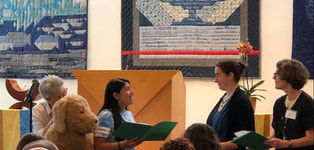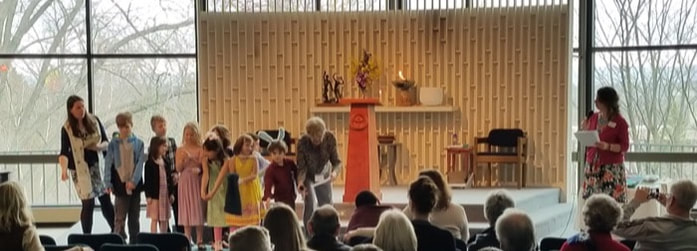Faith Development
 Group Storytelling
Group Storytelling
I believe that one of the purposes of religious community is to offer hospitality to the Divine within every person, regardless of age. Congregations do this by offering insightful worship, encouraging thoughtful questions, providing opportunities for lay people of all ages to practice justice and kindness, and creating networks of support. Everything we do in the parish affects our learning and growth, from worship to coffee hour to potluck dinners. Education is not limited to the classroom.
Religious education and faith development are best considered as a whole lifespan package. We support the entire congregation when we engage in both age-focused and intergenerational activities, from service projects to worship. I work to connect the themes and stories of adult and children's activities, such as when a sermon and children's classes both study the same UU principle on the same day. Even when we are in separate rooms, we should be mindful that we are one body.
Given that children and adults are always learning together, it is wise to offer parents and care givers tools for reflecting religiously with children. After all, children are presented with religious and ethical issues every day. Congregations can offer parenting classes, dinner-table questions of the week, and suggested reading lists on topics such as death, change, and God. Religious communities do right by all of our members when we consider their needs beyond Sunday.
When congregations worship and learn together, it is especially important to attend to the different modes of learning. Some people learn and worship best in the presence of attractive visuals, some need to involve their bodies with clapping or movement. Some people learn and worship best in an auditory experience, and some people need to participate in dialogue in order to absorb the ideas being approached. Our diversity is part of our strength.
I look for opportunities to get to know and to minister with age groups who might not routinely have contact with the senior minister, such as young children, teens, and seniors. Sometimes I approach this in an organized format such as adult faith development classes, outreach covenant groups for underserved constituencies, or planned involvement in Coming of Age and Bridging preparation. Other times, I create opportunities for casual, relationship-building engagement, such as when I attend social events with the elders group. In a congregation where religious education classes meet during the main worship hour, I would plan to use “fifth Sundays” when I am not preaching to visit religious education classes.
As the senior or sole parish minister in a congregation, I am everyone’s minister, from the youngest to the oldest. I am a collaborative team leader. The team includes staff and volunteers who ensure focused attention on different aspects of our shared ministry such as classroom learning and fellowship events, yet everything we do impacts every area of ministry, so it makes sense for the senior minister to be involved in lifespan faith development. In other words, we are in this together.
Religious education and faith development are best considered as a whole lifespan package. We support the entire congregation when we engage in both age-focused and intergenerational activities, from service projects to worship. I work to connect the themes and stories of adult and children's activities, such as when a sermon and children's classes both study the same UU principle on the same day. Even when we are in separate rooms, we should be mindful that we are one body.
Given that children and adults are always learning together, it is wise to offer parents and care givers tools for reflecting religiously with children. After all, children are presented with religious and ethical issues every day. Congregations can offer parenting classes, dinner-table questions of the week, and suggested reading lists on topics such as death, change, and God. Religious communities do right by all of our members when we consider their needs beyond Sunday.
When congregations worship and learn together, it is especially important to attend to the different modes of learning. Some people learn and worship best in the presence of attractive visuals, some need to involve their bodies with clapping or movement. Some people learn and worship best in an auditory experience, and some people need to participate in dialogue in order to absorb the ideas being approached. Our diversity is part of our strength.
I look for opportunities to get to know and to minister with age groups who might not routinely have contact with the senior minister, such as young children, teens, and seniors. Sometimes I approach this in an organized format such as adult faith development classes, outreach covenant groups for underserved constituencies, or planned involvement in Coming of Age and Bridging preparation. Other times, I create opportunities for casual, relationship-building engagement, such as when I attend social events with the elders group. In a congregation where religious education classes meet during the main worship hour, I would plan to use “fifth Sundays” when I am not preaching to visit religious education classes.
As the senior or sole parish minister in a congregation, I am everyone’s minister, from the youngest to the oldest. I am a collaborative team leader. The team includes staff and volunteers who ensure focused attention on different aspects of our shared ministry such as classroom learning and fellowship events, yet everything we do impacts every area of ministry, so it makes sense for the senior minister to be involved in lifespan faith development. In other words, we are in this together.
